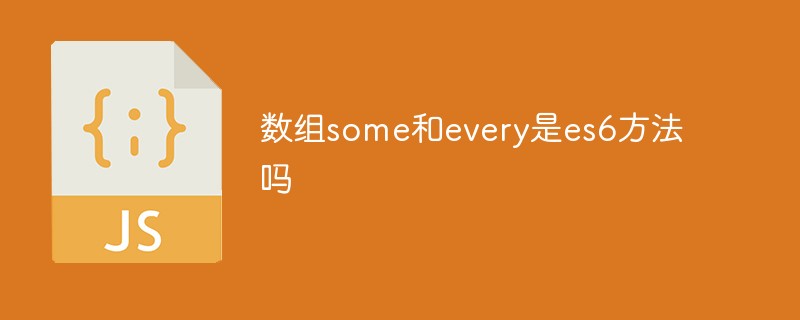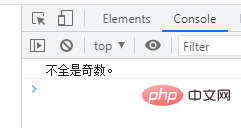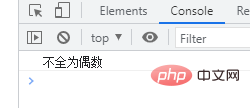
some and every are es6 methods. some() and every() are new methods of the es6 Array object. some() is used to detect whether there are elements that meet the conditions in the array. As long as one of them matches, it will return true; and every() is used to detect all elements of the array. Whether the elements all meet the specified conditions.

The operating environment of this tutorial: Windows 7 system, ECMAScript version 6, Dell G3 computer.
some() and every() are new methods of es6 Array object.
some() method: detects whether there are elements in the array that meet the conditions
every() method: detects whether all array elements meet the specifications Condition
es6 some() method
some() method is used to detect whether there is an element in the array that meets the specified condition. It exists (as long as Returns true if there is a match), returns false if it does not exist.
Thinking about it from another angle, some() can also be used to detect whether all the elements in the array do not meet the specified conditions. If they do not meet the specified conditions, it will return false. If one or more elements match, it will return true.
some() The specific usage is as follows:
array.some(callbackfn[, thisArg]);
Parameter description:
array: required parameter, an array object.
callbackfn: required parameter, a function that receives up to three parameters. The some() method calls the callbackfn function for each element in the array until callbackfn returns true, or until the end of the array is reached.
thisArg: Optional parameter, an object that can refer to the this keyword in the callbackfn function. If thisArg is omitted, undefined will be used to return false.
The song() method calls the callbackfn function on each array element in ascending index order until the callbackfn function returns true. If an element is found that causes callbackfn to return true, the some() method returns true immediately. If the callback does not return true for any element, the some() method will return false.
The syntax of the callback function is as follows:
function callbackfn(value, index, array);
Users can use three parameters to declare the callback function. The parameters of the callback function are described below.
value: The value of the array element.
index: Numeric index of the array element.
array: Array object containing the element.
The some() method does not call this callback function for missing elements in the array. In addition to array objects, the some() method can be used by any object that has a length property and has a numerically indexed property name, such as associative arrays, Arguments, etc.
Example: Detect whether the value of the element in the array is an odd number
If the some() method detects an even number, it returns true and prompts that it is not all odd; if no even number is detected, it prompts All are odd numbers.
function f(value, index, ar) {
if (value % 2 == 0) {
return true;
}
}
var a = [1,15,4,10,11,22];
var evens = a.some(f);
if (evens) {
console.log("不全是奇数。");
} else {
console.log("全是奇数。");
}
es6 every() method
every() method is used to determine whether all elements of the array meet the specified conditions ;Returns true only when all elements in the array meet the conditions, otherwise returns false.
The specific usage of every() is as follows:
array.every(callbackfn[, thisArg]);
Parameter description:
function f (value, index, ar) {
if (value % 2 == 0) {
return true;
}else {
return false;
}
}
var a = [2,4,5,6,8];
if (a.every(f)) {
console.log("都是偶数");
}else{
console.log("不全为偶数");
}
[Related recommendations: javascript video tutorial, web front-end]
The above is the detailed content of Are arrays some and every es6 methods?. For more information, please follow other related articles on the PHP Chinese website!
 es6 new features
es6 new features
 What are the new features of es6
What are the new features of es6
 c++sort sorting function usage
c++sort sorting function usage
 What software is dreamweaver?
What software is dreamweaver?
 How to resolve WerFault.exe application error
How to resolve WerFault.exe application error
 Reasons why website access prompts internal server error
Reasons why website access prompts internal server error
 How to insert page numbers in ppt
How to insert page numbers in ppt
 The difference between large function and max function
The difference between large function and max function